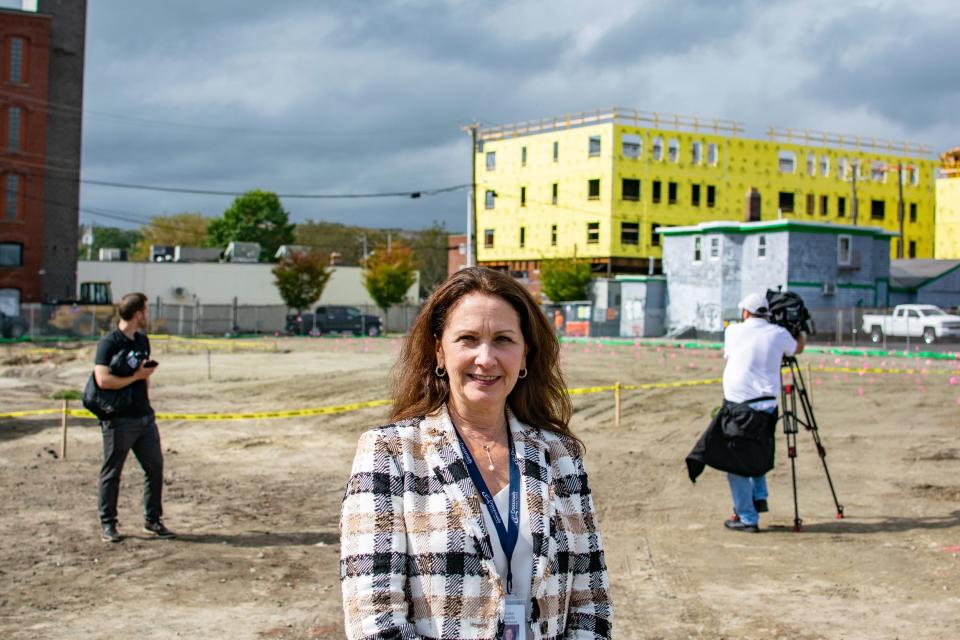A $5-million grant helped end RI family homelessness in 2018. It's not a panacea this time
- Oops!Something went wrong.Please try again later.
PROVIDENCE − Five years ago, Crossroads Rhode Island cleared all of the families on the state's homeless list after an infusion of $5 million from the Bezos Day One Fund.
And now, Crossroads, the nonprofit that helps homeless people across the state, is getting another $5 million to help families with children find homes and prevent their homelessness.
The $5 million comes with but one condition: it can only be used to help families with children dealing with homelessness, not childless couples or individuals without kids. Much of the model pushed by the Bezos Day One Fund is what Crossroads already does, "housing problem solving."

"It's going to be similar to what we did last time, with the perspective of scaling up what we already know is a successful model," Crossroads CEO Karen Santilli said. "We have a couple of new tools in the toolbox we didn't have last time around."
When Crossroads received the $5-million grant in 2018, the state's coordinated entry system, or CES, was in its infancy. Crossroads hired staff and moved families who had been in their 10-room Warwick Family Shelter into permanent housing, allowing them to convert the shelter into apartments.
The organization also renovated 30 family apartments across Providence, hired a full-time "housing navigator" to find apartments, landlords and property management companies and worked with the Providence schools to help families, not technically homeless but at risk of losing their housing, find permanent places to live, according to a case study.
"It may take us three to five years to end family homelessness, but these funds take us a long way toward that goal," Santilli said.
Housing problem-solving comes into vogue
Housing problem-solving, as a concept, has been coming into vogue since the last time Crossroads was awarded money from the Bezos Day One Fund, named after and funded by Amazon.com founder Jeff Bezos, who devoted $2 billion to the enterprise,
It is part of the 2022 federal strategic plan to end homelessness, the source of an additional $1 million provided by the state (and the state also recently awarded Crossroads a contract to be its coordinator of housing problem-solving, helping other organizations with technical and financial assistance).
Solving problems of housing availability and affordability is seen as so important because it is an easy way to keep families from being pushed into the downward spiral that losing housing can mean.
Staying in a hotel means burning through savings because the daily or weekly costs adds up to much more than the monthly cost of an apartment and sleeping in a tent or a car means limited access to basic hygienic facilities, which can precipitate a loss of employment.
"This stops that downward cycle, because if people don't have a place to live, their health starts declining, they've lost touch with their primary care doctor, they're starting to just use the emergency department," Santilli said.
The problems that can be solved are often financial, but not always. Some kinds of help include: money to pay off utility bills or for a security deposit/first month's rent on an apartment, transportation or clothing for a job interview. Sometimes it means non-monetary things too, like acting as a mediator between family members.
Housing problem-solving is increasingly important as the number of people displaced has grown as the housing market has become increasingly expensive, evidenced by the median price of a single-family home rising over 50% from 2019.
Many people are being displaced by rising rents. Housing problem solving helps get them into permanent housing they can afford, although the Crossroads workers tasked with finding housing are having an increasingly hard time finding anything for families, as most units they can find are one-bedroom or studio apartments.
Rhode Island's fundamental problem, fully exposed during and following the pandemic, is a lack of new housing and investment in housing, she said.
The money will also allow Crossroads to hire more case managers and Santilli said the organization has great benefits.
Crossroads works to raise $15 million for other projects
While the $5 million is a huge help for Crossroads to assist families with children, two-thirds of Crossroads clients are individuals or couples without children. The Bezos Day One Fund money can be used only to help families with children or infrastructure projects that will benefit families with children.
Crossroads has three apartment building projects: one on Pine Street, another on Summer Street and the renovation of "The Tower" once the Summer Street complex opens. All three projects are part of Crossroads' effort to raise $15 million to plug funding holes. The $5 million grant can't be used on any of them because they are not housing aimed at families with children.
Thanks to our subscribers, who help make this coverage possible. If you are not a subscriber, please consider supporting quality local journalism with a Providence Journal subscription. Here's our latest offer.
Reach reporter Wheeler Cowperthwaite at wcowperthwaite@providencejournal.com or follow him on Twitter @WheelerReporter.
This article originally appeared on The Providence Journal: Crossroads RI given second $5 million grant to end family homelessness

